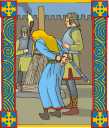Joan of Arc: France's Young Tragic Hero
She was born the youngest of a family of five. Her father was a peasant farmer who had little money. She never learned to read or write. Yet in her short lifetime, she became one of history's most famous people. Joan was born in Domremy on January 6, 1412. She the youngest of five children. As a child, Joan played with other children but also enjoyed being alone. Like other girls, she was good at sewing and spinning. Unlike other girls, she claimed to hear "voices." She said it was the voice of angels speaking to her, and she also claimed to have seen them. She had always been especially devoted to her religion, Christianity. She began to hear these voices in 1425, when she was 13. Three years later, she was convinced that God had spoken to her and told her to go to the service of the king, Charles VII. The French at this time were involved in another war against the English. (The two countries had fought many wars before that time, including the Hundred Years War.) In the current struggle, things were going badly for France. In 1428, Joan traveled to the neighboring town of Vaucouleurs to see the king's commander there, Robert Baudricourt. This man first turned Joan away with a laugh. But the next year, when Joan correctly predicted a great French defeat outside Orléans (the Battle of the Herrings), Baudricourt was willing to listen. In fact, he let Joan go to the king himself, who was at the French city of Chinon.
Her presence there had a swift and great effect. The English forts built to encircle the city were taken and the siege ended in an astonishing eight days. A month later, the French won again, at Patay. The following month, the French regained Troyes and then Reims. In an astounding three months, Joan of Arc had helped the French do what seemed impossible. The English were on the run. Though she was wounded twice in these many struggles, Joan fought on. She at first wanted to go home, especially after her first series of successes; but the army convinced her to stay. The French progress bogged down as the English dug in. Joan and the French fought on, and so did the English. In May 1430, Joan was captured. She was held in prison for many weeks and then brought to trial in Rouen, a French town in English possession. She was refused a lawyer and was treated cruelly in prison. At her trial, she insisted that the voices of angels had told her to help defend France against English invaders. This didn't go over too well with the English clergymen who were her judges. She was found guilty of heresy (largely because she claimed to have spoken with angels, which was against church law) and sentenced to be burned at the stake. She died on May 30, 1431.
Her life and death have inspired many solders, in France and elsewhere, ever since. |
|
Social Studies for Kids
copyright 2002–2024
David White



 Joan
convinced
Joan
convinced  Her
story is still told for several reasons:
Her
story is still told for several reasons:

